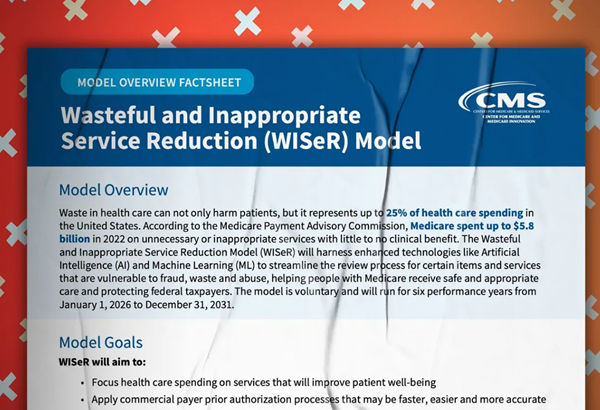CMS is Trying to Expand Prior Authorization in Traditional Medicare Even Though All Data Points Say That’s a Bad Idea
By Rachel Madley
July 7, 2025
 Just before the holiday, the Centers for Medicare and Medicaid Services announced a new model to test the expansion of prior authorization in traditional Medicare – and using private companies to do it. This model, named the Wasteful and Inappropriate Services Reduction (WISeR) Model, will “implement and streamline prior authorizations to ensure that select services that are provided and paid for are clinically appropriate.”
Just before the holiday, the Centers for Medicare and Medicaid Services announced a new model to test the expansion of prior authorization in traditional Medicare – and using private companies to do it. This model, named the Wasteful and Inappropriate Services Reduction (WISeR) Model, will “implement and streamline prior authorizations to ensure that select services that are provided and paid for are clinically appropriate.”
In theory, it sounds rational. Unfortunately, the details reveal that the model will enlist private companies that administer the prior authorizations for Big Insurance to expand the use of prior authorization in traditional Medicare. Even worse, the private companies participating in the model will be paid “based on a share of averted expenditures.” In other words, they will make a commission for each prior authorization request they deny.
Not many people realize that prior authorization is used in traditional Medicare (TM) at all, likely because it applies to a very small small number of services. Currently, TM requires prior authorization for 52 outpatient medical services, some durable medical equipment, and repetitive scheduled non-emergent ambulance transport. The prior authorizations are processed by the Medicare Administrative Contractors (MACs) and are required to be reviewed in a very short timeframe. Perhaps most importantly, the prior authorization decisions under the current process have been found to be more than 98% accurate. The limited scope, MAC review, and high accuracy ensure that current policies and procedures governing the use of prior authorization in traditional Medicare meet the intended goal of preventing wasteful spending without delaying or denying necessary care.
The WISeR model represents a complete departure from the typical prior authorization process in TM and explicitly references alignment with Medicare Advantage (MA) prior authorization processes. First, the model plans to have “companies that have experience implementing technology-enhanced prior authorization with other payers, including MA plans, as model participants.” Data submitted by MA insurers shows that 81.7% of prior authorization denials were overturned in 2023, more than double those overturned in TM. Further, the model mentions enhanced technology for prior authorization reviews. Unfortunately, these “enhanced technology” methods, such as using artificial intelligence (AI) to review prior authorizations, have been shown to deny care at much higher rates. For example, internal documents from MA insurers show that prior authorization denials increased exponentially for post-acute care services after naviHealth, a subsidiary of UnitedHealth Group that uses AI to review prior authorizations, began administering the process. This begs the question: Why is CMS recruiting outside companies that produce inferior results compared to TM? It seems that the MACs should be teaching these MA plans how to increase their accuracy.
Additionally, the WISeR model will compensate the companies participating in the model based on a share of the money saved. This creates a perverse incentive for the companies to deny care at a higher rate than necessary to receive additional compensation. These incentives already exist in the MA sector: Big Insurance has been known to increase prior authorizations to increase savings. For example, CVS in 2022 “‘de-prioritized’ a plan to reduce the overall volume of prior authorizations, concluding that the impact on lost savings to the company was ‘too large to move forward.’”
Finally, the WISeR model leaves the door open to unlimited expansion of the number of services subject to prior authorization in TM. The model lists 17 additional outpatient services that will be subject to prior authorization, a 30% increase in total services currently subject to prior authorization in TM. The model documents also state that the list of services was generated by looking at multiple sources, including the list of services for which MA plans require prior authorizations, and they note that “CMS may add additional services in future years.”
Prior authorization has been a hot topic for patients, providers, and lawmakers over the past few years. Ninety-three percent of physicians say prior authorization results in…
[READ THE COMPLETE ARTICLE HERE]
